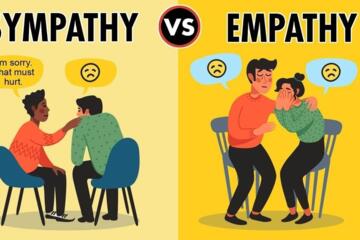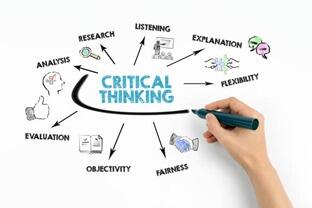At its core, critical thinking is the ability to analyze, evaluate, and interpret information objectively before making a decision or forming a belief. It’s thinking on purpose—not just reacting, assuming, or following the crowd.
A critical thinker is someone who:
-
Asks thoughtful questions
-
Examines evidence and logic
-
Considers multiple viewpoints
-
Recognizes bias and fallacies
-
Draws conclusions based on facts—not emotion or pressure
Put simply, critical thinking helps you separate what’s true from what merely sounds true.
Why Critical Thinking Is So Important
1. It Protects You from Misinformation
We’re bombarded with content—articles, videos, ads, hot takes. Not all of it is reliable. Critical thinking helps you ask, “Where’s this information from?” “What’s the source’s motive?” and “Does the logic hold up?”
In an era of fake news and AI-generated content, this isn’t just smart—it’s survival.
2. It Improves Decision-Making
Whether you’re choosing a career path, buying a car, or navigating relationships, strong decisions require clear thinking. Critical thinking forces you to slow down, weigh the options, and think through long-term consequences—not just quick fixes.
3. It Boosts Problem-Solving Skills
Life is full of unexpected problems. Critical thinkers don’t panic—they pause, assess the situation, and explore different solutions. This mindset is invaluable in the workplace, especially in roles that require creativity, strategy, or leadership.
4. It Enhances Communication and Debates
Have you ever tried to argue a point and realized halfway through that your logic was shaky? Critical thinking helps you structure your ideas, anticipate counterarguments, and discuss issues more thoughtfully and respectfully.
5. It Encourages Lifelong Learning
Critical thinkers are curious. They don’t just accept answers—they seek to understand why something works. This mindset keeps your brain sharp and your worldview open, even as things change.
How to Develop Critical Thinking: Step-by-Step
You don’t have to be a philosopher to think critically. It’s a skill you can strengthen with simple, daily practices.
1. Ask Better Questions
Instead of passively absorbing information, start asking:
-
What’s the evidence for this?
-
Who benefits from this idea?
-
What assumptions am I making?
-
Is there another perspective I’m missing?
Good questions lead to better insights.
2. Slow Down and Reflect
Modern life rewards speed—but fast thinking often leads to shallow thinking. Build in time to reflect. Before making a decision or sharing an opinion, ask yourself: Am I reacting emotionally or thinking clearly?
Even a 30-second pause can change your response.
3. Evaluate Sources Carefully
Not all information is created equal. When researching, consider:
-
The credibility of the author or organization
-
The evidence used (Is it anecdotal? Backed by data?)
-
The tone (Is it neutral or emotionally charged?)
-
The presence of logical fallacies (e.g., false cause, ad hominem)
A healthy dose of skepticism is a critical thinker’s friend.
4. Play Devil’s Advocate (With Yourself)
Try arguing the opposite side of your belief. This helps expose weak points in your reasoning—and builds empathy for people who think differently.
Example: If you’re convinced that remote work is always better, ask: What are potential downsides? Who might it not work for?
5. Keep Emotions in Check
Feelings are valid—but they’re not facts. A critical thinker acknowledges emotions without letting them cloud judgment. Practice separating how you feel about something from what’s objectively true.
Common Thinking Traps to Watch Out For
Even the best thinkers fall into mental shortcuts. Here are a few to avoid:
-
Confirmation Bias: Only seeking out info that supports what you already believe.
-
Straw Man Fallacy: Misrepresenting someone else’s argument to make it easier to attack.
-
Appeal to Authority: Believing something just because an expert said it—without evaluating the reasoning.
-
False Dilemma: Seeing only two options when more exist (e.g., “You’re either with us or against us”).
Awareness of these traps makes it easier to spot and avoid them.
Real-Life Applications of Critical Thinking
-
At Work: Analyze project risks, make data-driven decisions, and improve team discussions.
-
At School: Write stronger essays, engage in debates, and solve complex problems.
-
In Relationships: Communicate with empathy, resolve conflicts constructively, and avoid jumping to conclusions.
-
As a Consumer: Read reviews critically, spot marketing tricks, and avoid scams.
In short, critical thinking helps you become a more thoughtful, responsible, and effective person—in every area of life.
Conclusion: Think Better, Live Better
Critical thinking isn’t just an academic skill—it’s a practical superpower. In a world full of noise, being able to think clearly, question wisely, and decide intentionally can set you apart.
You don’t have to be perfect. You just have to start thinking about your thinking. Over time, it becomes second nature.
So the next time you're faced with a tough choice, a persuasive headline, or a heated argument—pause. Ask a few questions. Weigh the evidence. And trust your ability to reason.
Because a better world starts with better thinkers—and that includes you.









